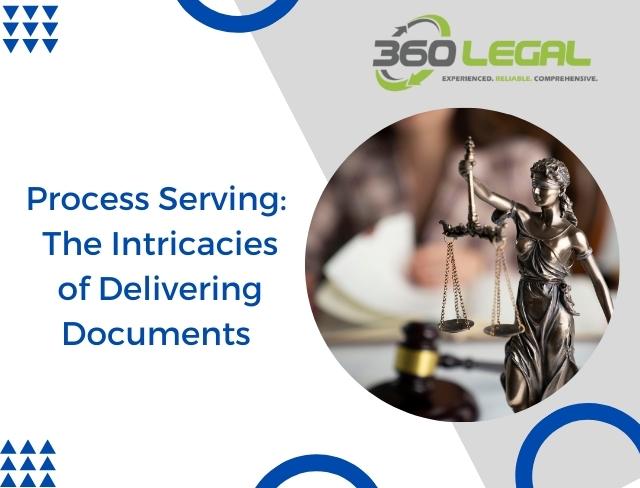Recognizing the Value of Refine Offering in Lawful Procedures
Refine offering is an essential facet of lawful procedures that makes certain all parties are informed of their legal rights and obligations. By promoting the formal delivery of essential lawful files, it upholds the concepts of due procedure and adds to the integrity of the judicial system. The nuances of efficient process serving extend beyond simple distribution; they incorporate lawful requirements and possible repercussions of inappropriate service. Recognizing these ins and outs can significantly influence the end results of lawful disagreements, prompting a more detailed evaluation of the techniques that underpin this essential function.
Definition of Process Serving
Refine offering is a critical part of the legal system, specified as the official distribution of legal papers to people entailed in a lawsuit. This procedure ensures that all events are sufficiently notified of lawsuits being taken versus them or to which they are a celebration. Commonly, these papers consist of summons, complaints, subpoenas, and various other court-related papers that need the recipient's interest and response.
The value of procedure offering lies in its function in maintaining the principles of due procedure. It ensures that people have notification of lawful procedures, consequently offering them a chance to react or defend themselves. Proper service of procedure is not simply a procedural rule; it is an essential aspect of making certain justness and openness in the judicial system.
Process serving can be carried out by various people, including specialist procedure servers, law enforcement police officers, or perhaps lawyers, depending on jurisdictional guidelines. Each method of solution has its very own standards and techniques, which are essential to avoid delays or dismissals within the legal structure. Understanding the definition and feature of process offering is important for all stakeholders included in lawful procedures.

Legal Demands for Process Serving
Lawful demands for process offering are necessary to make sure that the delivery of lawful papers sticks to developed procedures and is recognized by the court. Each jurisdiction has details laws regulating how and when documents need to be served, which might include summonses, problems, and subpoenas.
Typically, procedure web servers should be impartial 3rd parties that are not associated with the situation. They need to additionally follow state regulations regarding service methods, which can include individual service, alternative solution, or service by mail. Individual service includes delivering documents directly to the recipient, while substitute solution enables for delivery to an additional accountable individual at the recipient's house or workplace.
Additionally, procedure servers are generally required to submit a proof of solution, a legal document that confirms the distribution of papers, with the court. This paper consists of details such as the day, time, and approach of service, along with the name of the person offered.

Role in the Justice System
An important part of the justice system, procedure serving see this page guarantees that individuals associated with legal procedures are properly informed of actions taken against them (Process Serving). This formal notice is essential for upholding the principles of due procedure, which mandates that events have the opportunity to reply to claims made versus them. Without reliable procedure offering, the lawful system would be made inefficient, as individuals could engage in actions without awareness of pending lawful issues
Process-server serve an important function in securing the integrity of the legal procedure. They work as neutral parties, supplying lawful papers such as summons, problems, and subpoenas, therefore fostering openness and liability within the judicial structure. By making sure that all celebrations are informed, procedure serving helps to stop any kind of possible unjust advantage, permitting for equitable engagement in lawful procedures.
Furthermore, the expertise of process web servers adds to the public's count on the justice system. Their adherence to lawful standards and moral methods strengthens the authenticity of the judicial process. Ultimately, reliable process offering is crucial in promoting the rule of regulation and ensuring that justice comes to all individuals associated with legal disagreements.
Consequences of Improper Service
The consequences of incorrect solution can substantially threaten the stability of lawful proceedings. When a celebration is not offered correctly, it can result in a host of difficulties, including delays in the event timeline and enhanced legal expenses. Improper service can result in the accused not understanding the lawful activity against them, which might prevent them from reacting appropriately or providing their protection. This absence of notice can ultimately cause fail judgments, where the court guidelines in favor of the complainant without listening to the offender's side.
Furthermore, incorrect solution can provide court orders and judgments void, compeling the complainant to reactivate the procedure, which can be both financially burdensome and time-consuming. It can also open up the door to appeals and challenges, as the offender might suggest that they were not appropriately informed of the procedures, complicating the legal landscape further.
Best Practices for Effective Solution

Second, go right here timing plays a crucial role. Serving documents quickly can protect against delays in lawful procedures and ensure that all events are alerted in a timely way. Additionally, employing a specialist process-server can boost effectiveness, as they are educated to browse potential difficulties and make certain compliance with neighborhood legislations.
Third, preserving precise records of the solution process is imperative. Recording the day, time, and way of solution can offer vital proof if disagreements arise pertaining to whether solution was properly performed.
Verdict
In conclusion, process serving is an essential part of lawful treatments, making certain that all events are properly alerted and managed read the possibility to react. Complying with legal demands and best practices not only upholds the principles of due process but additionally reinforces the integrity of the justice system. The consequences of improper solution can cause substantial hold-ups and issues, highlighting the requirement for efficient process offering in advertising fairness and ease of access in legal disputes.
The subtleties of efficient process offering expand beyond mere distribution; they encompass lawful demands and prospective consequences of inappropriate solution.Process offering is a critical element of the legal system, specified as the formal delivery of lawful files to individuals entailed in a court situation. Without reliable procedure serving, the legal system would certainly be provided ineffective, as people might engage in activities without awareness of pending lawful matters.
Refine servers offer an important duty in securing the integrity of the lawful process - Process Serving. The effects of improper solution can lead to significant hold-ups and complications, highlighting the need for effective procedure serving in promoting justness and ease of access in lawful conflicts